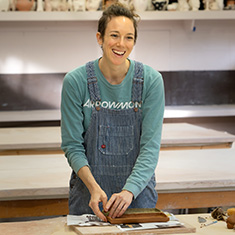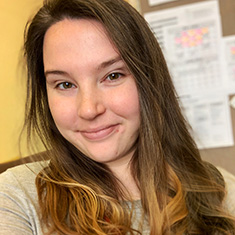2023 Wall Awards presented to four alums pushing for inclusivity, expanded knowledge
Dec. 14, 2023 — Four projects developed by Grinnell College graduates have been selected for the 2023 Joseph F. Wall ’41 Alumni Service Awards.
Maggie Connolly ’07, Smita S. ’08, Lisa Eshun-Wilson ’14, and Mikayla Findlay ’16 are the award recipients. They will use the $40,000 prizes to address personally meaningful projects in the fields of arts, technology, community-building, and Diversity, Equity, and Inclusion.
The award is named in honor of Joseph F. Wall ’41, professor of history and longtime dean of the College, who inspired the ideal of social responsibility in his students. It was established as a tribute to the College’s tradition of social commitment.
Each year, a committee composed of alumni (including previous Wall Service Award recipients), a student, and faculty members, reviews applications and awards the $40,000 prizes to either jump-start or complete a project that shows creativity and commitment to effecting positive social change.
During the past 27 years, the Wall Service Award has been presented to 68 individuals who have contributed their time and talents to 61 diverse projects throughout the U.S. and 17 other countries. The College has given out more than $1 million to alumni through this award program.
The following is a closer look at the projects of this year’s recipients.
Maggie Connolly ’07
 Maggie Connolly ’07
Maggie Connolly ’07
Connolly’s project – The Bottom Knox Ceramics Soul Collective – provides ceramic arts education at a community center whose mission is to build community, celebrate culture, and engage the creativity of Black people in Knoxville, Tennessee. The ceramics workshop at the Bottom has already served more than 50 people in its first year of operation and provided opportunities in the form of exhibitions, markets, and teaching workshops. The Bottom Ceramics Soul Collective has gathered weekly in community workshops.
The $40,000 award will be used in several ways, including renovating the basement of the Bottom Community Center into a full ceramics’ studio, complete with potters wheels and a kiln. Part of the grant will go toward providing teacher pay to collective members who want to teach ceramic workshops.
“The funding received from the Wall Service Award will not only guarantee another year of materials and instruction offered free of charge to community members; it will also allow students to progress in their ceramic art making and provide opportunities to community members to teach each other, allowing the community to expand and strengthen,” Connolly says.
A studio art major at Grinnell, Connolly moved to Nanjing, China, in 2007 with the Grinnell-in-Nanjing Fellowship Program, starting a 12-year journey into Asian ceramics. She earned a Master of Fine Arts in ceramic design from Tsinghua University in Beijing, China in 2013 – the first ever American to do so. Today, she is full-time professional artist with Mighty Mud studios in Knoxville.
“Art is one of the most valuable parts of the human experience that should be accessible to all peoples; this project ensures that this will continue to happen, even after the grant period has ended.” Connolly says. “Allowing communities to have a safe space in which to explore individual and collective identity through art making is an invaluable experience.”
Smita S. ’08
Smita’s project draws on longstanding interest in fostering democratic society in Malaysia by encouraging more open and equitable access to information. She will use the Wall Award to develop web resources and trainings that will provide Malaysians with credible information and user-friendly guidelines for accessing public services and navigating governance systems.
“The purpose of this project is to help Malaysians navigate the many barriers to accessing high quality information relevant to their daily lives as residents, workers, consumers, and citizens,” Smita says. “By making good, relevant information freely and far more easily available to everyone, we can disrupt a key strategy in the reproduction of inequality and social fragmentation on the basis of race, class, language, and location.”
Smita intends to create and publish two websites: one to demystify and disseminate information on Malaysia’s governance system, and the other to offer guidance on civil liberties, labor rights, consumer rights, and civic education for Malaysian residents, citizens, and non-citizens alike.
Since language is a key determinant of access to public services, residents who are not versed in Malay are at a disadvantage, notes Smita. This project will be planned for and with diverse and multilingual groups who live in the country, and information will be made available in Bengali, Burmese, Chinese, and Tamil, in addition to English and Malay.
Smita previously worked with NGOs focusing on women’s rights and development. After some years away, she returned to Malaysia in 2018 and volunteer taught at an informal school for stateless children. “There I learned to see the specific ways in which information gaps entrench marginalization and inequality,” she says.
In addition to these websites, part of the grant will be used to develop and run offline trainings and local community events on information literacy and civic education, primarily for school students.
Lisa Eshun-Wilson ’14
 Lisa Eshun-Wilson ’14
Lisa Eshun-Wilson ’14
A postdoc research fellow in biology at the Scripps Research Institute in California, Eshun-Wilson has started a Diversity, Equity, and Inclusion (DEI) initiative aimed at creating an inclusive and supportive climate at the institute for underrepresented minority postdoctoral scholars. Called inclusiveScripps, or iScripps for short, the project raises awareness about issues that disproportionately affect underrepresented minority trainees, such as stereotype threat, imposter syndrome, the mentoring gap, and income disparity-related issues.
“My aim is to craft an inclusive, welcoming environments for scientists of all backgrounds so they can confidently pursue the unknown wonders of the universe,” Eshun-Wilson says. “My experience as an African American woman from South Los Angeles has allowed me to gain direct insights into the educational and institutional initiatives necessary to recruit and retain talented scientists from some of the most vulnerable and limited backgrounds.”
A key part of iScripps is implementing an “Office Hours” mentoring program, which will give postdoc students the opportunity to foster productive mentee-mentor relationships or future collaborations with faculty members who identify as underrepresented minorities or are active allies.
The mentoring program will be modeled after the one Eshun-Wilson created at the University of California, Berkley. As a doctoral student, Eshun-Wilson established iMCB – inclusive Molecular and Cell Biology, which included an annual conference. Similarly, she plans to establish a conference in the spring at Scripps and invite speakers who champion both science and DEI-related work.
“iScripps will not only promote equity in education and increase diversity in academia, but also acknowledge the complexity and interconnected aspects of identity and use this perspective to help organizations design more effective interventions and policies,” she says.
Mikayla Findlay ’16
 Mikayla Findlay ’16
Mikayla Findlay ’16
Since returning to her hometown of Lincoln, Nebraska in 2017, Findlay has been involved with Common Root Mutual Aid Center, a volunteer nonprofit that creates a culture of inclusivity by hosting free community-building events. A key tenet of Common Root’s mission is uplifting other social justice organizations, and Findlay will use 75 percent of the Wall Award funding for that purpose.
The Common Root Community Grant will provide $250 to a dozen community organizations, artists/local makers, and fundraisers each year. Common Root volunteers will choose three recipients quarterly based on democratic consensus following nominations and group discussion.
“Common Root Mutual is a central hub in a network of grass-root nonprofit organizations that perform heavy lifts on shoestring budgets,” Findlay says. “I wanted to create this grant to recognize and help people in my community who are already doing the work – feeding people, bringing people together, and supplying the basic physical, social, and emotional needs of the community.”
The other 25 percent of the Wall Funding will be used to subsidize approximately half of Common Root’s annual operations costs for the next 10 years.
Findlay is a budget analyst for the Nebraska Legislative Fiscal Office, so she is well versed in grant tracking and reporting.
“My experience at Grinnell highlighted for me the ways in which people will congregate around their passions and how often they overlap in the strangest of ways,” Findlay says. “Well-documented successes from this project will enable us to seek additional competitive funding in the future. Like Grinnell College, Common Root became a source of my introduction to lifelong friends. I want to be around people who enthusiastically take upon the obligation to make this world a better place.”
—by Jeremy Shapiro